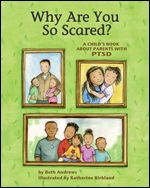Play Therapy at Home, Day 12: Parent with PTSD
I have been thinking about this topic for a while. My counseling practice tends to run in themes. Sometimes a majority of my clients are dealing with loss, sometimes domestic violence, and lately parents struggling with Post Traumatic Stress Disorder (PTSD). It hasn’t helped that our first deployment was in the media recently for some additional awards going to some of our soldiers. As awesome as it is, and I am so proud of our soldiers and families, it has “uncorked” some feelings across the board. Traumatic events in our lives never fully go away. We hopefully learn to deal with the emerging emotions and physical reactions to it better, but life has a way of “uncorking” it at unsuspecting times.
PTSD involves a variety of symptoms that occur in a person’s life when they are exposed one or multiple times to a traumatic event. Symptoms can range from irritability to rage, anxiety to avoidance/phobias, and trust issues with others, among other symptoms.
For more on what PTSD is and symptoms associated with it, click here. I’ve covered in a previous post some ideas on how to work with children who have been through significant trauma. But how do you work with children when they are trying connect with a parent who is struggling? Parents who are struggling with PTSD from an event or multiple traumas can often struggle with anger, tend to withdraw, and react in ways that make a child feel unsafe.
Most often, this is a time for family therapy- an opportunity to work with the family system, the marriage, the relationships between parent-child, etc. Working around a military culture, I have a lot of mothers who bring their children for play therapy to sort out the experiences the children have had with a father who have PTSD from combat. So, in this post, I am going to use “him” for the struggling parent- not to say that a mother couldn’t be the one struggling.
Because there are so many unique family dynamics, it’s hard to be too specific on how to work through play. But, I think we can all relate to a degree. Family and relationships are messy. We all want to have a great connection with our kids, but because we are ALL flawed- we will have experiences with them where our connection will be damaged. The important thing to remember is that we are not responsible for our spouse’s connection with our children. They are. That is super hard to believe. We somehow take on their decisions as a reflection of us because we love them and have a marriage with them- but you simply cannot take ownership for all of their decisions. If a spouse does something to hurt their relationship with their child- there is nothing you can say to your child to heal that connection. Comfort and be present with them? Yes, but true healing happens between those two. Explaining to a child the basics of what the other parent is struggling with helps, but making excuses, or taking them the park extra doesn’t heal it all. That bond will not fully heal until the two of them do it themselves. Military wives understand this to the extreme when they attempt to be both parents while the soldier is away. She will soon find out in the midst of exhaustion, that there is simply no replacement- you do your best to be your best. Have patience and trust timing ans wisdom. It may not happen in the time you want it, but can eventually happen in a moment, over time, or as it is periodically revisited.
That may sound discouraging for you, but when you think about it- it is quite freeing. When you think about your childhood- don’t you think about how you would have loved for your Dad to swing you off your feet, or taking you for that fishing trip, or your mom to hold you during that difficult time? Do you remember anyone else standing in that gap that healed that wound? No. Community helps, other mother-figures or father-figures impacted your life and helped you develop into a fine person, but when it comes down to it- our parents were flawed because we ALL are flawed. All of our children, including mine, will benefit seeing a therapist someday because there is something about realizing we are all flawed that is disappointing, gives us permission to forgive ourselves for not being perfect, and then goes on to heal our relationship with God and humanity. God is the only one that is perfect, the rest of us have to figure out how to reconcile with the rest of the world.
So, the first thing is that if your spouse (who is struggling with trauma) is doing ANYTHING unsafe- you must follow your responsibility to children who count on you to protect and teach them boundaries in life by making sure they have a safe environment to live in- so that the parent dealing with trauma doesn’t create a new trauma for the child. God made you- just they way He wanted to- amazing and wonderful. He made your children that amazing too (why do we see our children made more wonderfully than us?). He would want you to protect yourself and your children. Period. You have permission- from God- to protect yourself and your children from abuse and dangerous behavior.
Now that I said that, there are behaviors (like responding in isolation, drinking heavily, rage) a struggling spouse may do that make home environment difficult to live in. Without going into all the family dynamics and adult dynamics, I will give you things to try with your child to help identify what they might be feeling and then teach them how to communicate it.
With PTSD, there are “triggers”-a normal daily task or experience that brings back up memories and sensations of the trauma. Because all of the sensory areas of the brain light up during trauma for the sake of survival, memories are captured in those senses. This is why when the memory comes up, the person feels, hears, sees, smells the memory like it is happening in the present. Because of this, their body escalates with adrenaline (survival again) and then they react. As a family, it is important to be compassionate and understanding. However, when it begins to feel like walking on eggshells, or keeping a bomb form exploding- you are talking about the family suffering too.
Teaching the kids to be respectful and mindful is always great, but children of parents who struggle with PTSD will sometimes take on adult responsibilities by taking care of the parent. I once had a child who knew to bring his mother water when she would have panic attacks. Although I see nothing wrong with this kind of compassion, if he began to take on extra adult responsibilities around the house, or tasks the mother should be able to do for herself it can become unhealthy. One of the things he was struggling with was developing his own anxiety while at school. Who would take her water if she had a panic attack? It was then that mom began to see that she needed to both get treatment as well as assure him more that he was being helpful, but that she would learn to cope when he wasn’t there.
Telling details of the trauma to the child can vicariously traumatize the child. If your spouse wants some time to share the memory, respectfully asking for a time out long enough to find an activity for the child to do is being respectful of both.
I would encourage the children to draw or paint pictures on separate occasions of the family, them with the struggling parent, as well as how they see the parent. Talk with them, don’t ask leading question (i.e. That makes you sad, doesn’t it?). Instead, ask them to describe their picture. Ask them to tell you about their favorite things about you and your spouse. If they talk about any feelings they have that would show concern for their connection being broken with the other parent, ask them if they ever feel like they could talk to him about that. Have a conversation where you don’t do the work that dad needs to do, but that you just listen. Children often just need to feel heard and understood. Ask them what they would like to see different between them and their Dad or in the home.
One of the signs of maturity as an adult is the ability to confidently communicate how we feel, especially in a relationship. In marriage and in work, we need the ability to sometimes ask for change and express concerns. As parents, we are teaching our children how to eventually do that. For some reason, we feel the need to protect them from having hard conversations. Do you ever ask your children what you could do to be a better Mommy? Try it sometimes, their answers are priceless and often not what you would expect. Creating these times for open dialogue can make it easier for kids to talk as they get older, and develop confidence to ask for something to change, to express hurt, or have the tough conversations that sometimes don’t happen in life.
If you feel your spouse is open to it, encourage your child over time to “show his pictures to Daddy and talk about them” during an open and safe moment when the spouse has been prepared for it (it is never a good idea to ambush or surprise your spouse). Of course, I am not advocating your using this in a manipulative way, but encouraging your child to own their relationship with their parent. It may not always go smoothly, but communication never promises that either. If they feel uncomfortable, you could offer to be there with them. Now that might scare some of you, fearing it would create conflict. As difficult as this is to sit through, it is the weight of seeing our consequences that often causes us to try something different. If they responded to you question about being a better Mommy, with “I wish you would put your phone down” that would feel awful, wouldn’t it? But would you feel that the next time you picked up your phone around them?
If you feel that your child talking to him could cause intense destruction, then using counseling as a neutral territory could be beneficial to everyone. Until then, using play therapy as an outlet for your child to express his anxiety and other feelings could be helpful.
The important thing is that the children have an opportunity to process feelings in a safe place, teaching them to somehow communicate it to others, and for the right people to feel the weight of their own relationships with each other. It is in that space that people begin to make the choice to build (sometimes by getting help) or continue to destroy those around them.
By the way, if your spouse is doing something right… encourage them today by telling them so! We all need to hear it. Even if a spouse is struggling- let them know what they are doing well and what you think is going right so they know to keep trying. Fighting for your marriage and family takes initiative on both parts, patience, community, help, and the right tools to bring purpose out of any situation. I would love to hear what you have learned!!

 Why Are You So Scared?: A Child’s Book About Parents With PTSD By Beth Andrews, LCSW
Why Are You So Scared?: A Child’s Book About Parents With PTSD By Beth Andrews, LCSW
When a Child’s Parent has PTSD
Understanding PTSD in Children and Teens
New Changes in DSM related to PTSD
